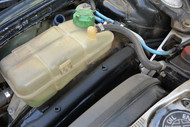Antifreeze vs Coolant: What's the Difference?
13th Jul 2023

Do you know the difference between antifreeze and coolant? Many drivers assume they are the same. The terms "antifreeze" and "coolant," in fact, are often used interchangeably. Antifreeze and coolant, however, serve different purposes. They are two different types of liquids that are used for different purposes.
What Is Antifreeze?
Antifreeze is a liquid with a lower freezing point than that of water. Water freezes at 32 degrees Fahrenheit. Antifreeze, on the other hand, freezes at about 0 to minus 5 degrees Fahrenheit. There are different chemicals used for antifreeze, one of the most common being ethylene glycol. It's not immune to freezing. Nonetheless, ethylene glycol and other antifreeze chemicals have a lower freezing point than water.
What is Coolant?
Coolant is a liquid that's designed to regulate engine temperatures. It's known as "coolant" because it "cools" the engine. Engines produce heat as a byproduct of combustion. As your vehicle's engine burns a mixture of gas and air, it will create hot exhaust gases. Coolant will flow through the engine to collect this heat. After absorbing the engine's heat, the hot coolant will travel to the radiator where a fan releases the heat.
Common types of coolant include the following:
- Inorganic Additive Technology (IAT)
- Organic Acid Technology (OAT)
- Hybrid Organic Acid Technology (HOAT)
Differences Between Antifreeze and Coolant
Antifreeze and coolant serve different purposes. Antifreeze is used as an additive to lower the freezing point of the product to which it's added. Coolant, in comparison, is used to regulate engine temperatures.
Most forms of coolant contain distilled water and antifreeze. The distilled water removes heat from the engine, whereas the antifreeze protects the water from freezing.
Without antifreeze, coolant may freeze in the winter. Distilled water is just plain water that, as the name suggests, has gone through a distillation process. When exposed to freezing temperatures, it will turn to ice. Antifreeze prevents this from happening by lowering its freezing point.
Antifreeze is commonly used in coolant (as an additive), but you can find it in wiper fluid as well. Many drivers use antifreeze in their wiper fluid for the same purpose: it protects the wiper fluid from freezing.
In Conclusion
Antifreeze and coolant may be interchangeably in everyday conversation, but they serve distinct purposes. Antifreeze prevents freezing during colder temperatures and protects against rust and corrosion, while coolant helps maintain the engine at an optimal operating temperature.

